

Science and Human Happiness Essay & Paragraph
How does human happiness relate to science? How is modern science influencing and changing our way of life? How much do our daily needs, aspirations, and happiness depend on science? What is the contribution of science to the development and progress of human civilization ? Can’t our life be happy without the help of science? These are questions that require thinking. And the answer to these lies in our following 1000-word long scholarly essay: ‘Science and Human Happiness’. Then there is a short 100-word ‘Science and Human Happiness Paragraph’, which summarizes the subject in a few sentences.
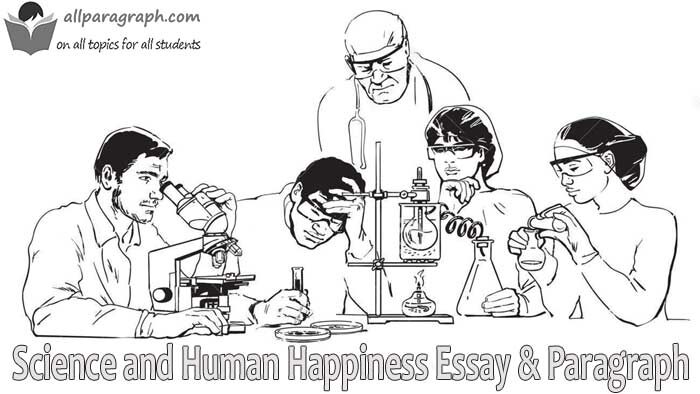
Science and Human Happiness Essay, 1000 Words
By: Haque | For: Higher readers | 12-06-’22
Modern life and science are inextricably linked. Much of human happiness today depends on the way in which man uses the vast power that science has bestowed upon him. Science is the only major civilizational yardstick by which progress and prosperity of human civilization can be best gauged. It is virtually impossible to imagine how the modern man can survive in the absence of the various discoveries and inventions which the scientists have made from time to time and which have rendered modern life comfortable and worth living. The life-changing electricity, the improved means of transport, magical communication, and organized lifestyle have all become an indivisible part of modern life. Apart from these milestones, science has done immense help to us by inculcating a scientific outlook in us which moves the wheel of civilization in pursuit of newer scientific discoveries and inventions for the betterment of mankind.
Happiness today would mean not only freedom from want and drudgery but also the positive feelings generated by a civilized existence in a comfortable and secure home embellished by varied means of entertainment. The major source of happiness is electricity which is one of the astounding scientific discoveries so far made. It has not only driven away age-old darkness but also made everything possible. From small domestic gadgets to large-scale industry electricity is the sine qua non. The modern world minus electricity is unimaginable. Modern cities, modern industries, and above all modern life are squarely defined by electricity.
Agriculture, the lifeline of mankind, is greatly developed by scientific equipment and methods. Had there been no science, agriculture would have been incapable of feeding above seven billion people today. The land is finite. The development of the hybrid variety of crops has enabled highly populated countries India and China to feed their burgeoning populations . Improved transport and storage facilities have finally secured man against the ravages of droughts and famines. Revolutions in agriculture by scientific methods have brought about an unprecedented increase in the production of food grains. This has rendered countries self-reliant in food production and made starvation death a scourge of the past. If one-third of the population of the world still goes half-fed or undernourished, the fault lies not with science but with the political and social systems prevalent in most parts of the globe which are still impaired by exploitation, inequity, and discrimination.
Luxury, comfort, and leisure time have been assured to man by science. Man is no longer subject to the tyranny of the elements — to freezing cold and scorching heat. Central heating systems, air conditioners, and air coolers developed and designed by scientists and technicians have made it possible for human beings to keep their homes, offices, and workshops at a desirable temperature most conducive to body and production. Domestic drudgery is rendered the status of a fairy tale in most of our houses. Electronic and electrical gadgets like refrigerators, grinders, ovens, induction cookers, pressure cookers, etc. have eliminated drudgery at home. For entertainment, science has placed us a number of discoveries and inventions like televisions , music systems, films, and a host of many gadgets and instruments.
Unforeseen progress in transport and communication has been of huge help and comfort to modern man. Distance is no longer a matter of concern nor is accessibility. The whole world has turned into a global village after the invention of high-speed automobiles and jet planes. The development of roadways, railways, airways, waterways, and conveyances has been possible by scientific research and discoveries. It is now possible for a man to go from one corner of the world to another corner in the smallest possible time. Communication devices masterminded by scientists are helping people in a great many ways. Computers , the internet , and other electronic means of communication are blessings for mankind. Governance, business, trade and commerce, bilateral relations, and international cooperation are effective and successful for the development of transport and communication.
In the health sector science has been a messiah of common people from chronic and fatal diseases like cancer, AIDS, Hepatitis B, etc. Health services have been made cheap and affordable for the poor and the needy. Medicines, surgical instruments, measuring instruments, scanners, difficult surgeries, and many medical instruments and machines have been gifts of science to mankind. Life-saving drugs have reduced mortality rates drastically. Man is assured of good health by science. It leads to happiness because man lives a healthy and disease-free life.
Modern cities and urban amenities are well-designed and structured to give us a sense of the most civilized being. Delicious dishes, entertainment facilities, modern parks, round-the-clock transport, wifi environment all have been tributes of science to mankind. Even the face of rural areas is being transformed with the inclusion of modern discoveries and inventions. Science and scientific outlook have recovered the rural communities from the age-old darkness of superstitions, ignorance, and traditional evils. We think scientifically now.
Science and scientific outlook have filled our hearts with joys and happiness without which mankind would have been grappling with barbarism to date. It has enriched life, made us more rational, and rendered life comfortable and worth living. However, the discovery and inventions of modern warfare, destructive weapons, and fatal means which are all possible by science are posing threat to the survival of mankind. But for this inhuman devolvement science is not at fault; rather it is we who have misused science against the interest of mankind. Science is a bad master but a good servant. In fact, the importance of science and technology is second to none on the earth.
Science and Human Happiness Paragraph, 100 Words
By: Haque | For class 6-7 | 05-04-’22
Science is deeply involved in our lives today. Our daily needs, aspirations, and happiness depend on science. The wonder of science has made our lives easier. Electricity, high-speed travel and transportation, instant communication, and advanced medical care are all a gift of science. Even our means of entertainment are also contributed by science. Without the help of science, our life can never be happy. So, we can say without hesitation that science has brought a lot of happiness and comfort to human life. However, it is not impossible to misuse scientific discoveries. Weapons of mass destruction are examples of misuse. We should make good use of the power and potential of science and prevent its misuse.
Check out 300+ English Essays & Paragraphs
About the Author
A teacher, writer and blogger, started allparagraph noting students search online for paragraphs on various topics, short and simple essays , edifying stories and other materials of study . In composing these lessons we have tried to use as simple language as possible, keeping young students in mind. If you find any text inappropriate, please let us know so we can make it more useful through necessary corrections and modifications. Thank you!
Leave a Comment Cancel Reply
Your email address will not be published. Required fields are marked *
Save my name, email, and website in this browser for the next time I comment.
Adblock Detected!
Please help us run the website by disabling your ad blocker..
83. English Essay Example on: Science and Human Happiness

Science and Human Happiness
The modern age is the age of science. Wherever we go, we find articles based on some of the other scientific formulas.
For instance, many of the students and office goers get awakened with the help of an alarm clock. The factory goers learn about the factory time through the buzzing of a hooter.
People generally go to places of work by using one or the other vehicle. The food they eat is prepared on the stove or gas oven. The clothes they wear are prepared in big factories and mills.
Science has enabled the modern man to fly in the air like birds and swim in the sea like fishes. Even more than that he can even travel in space which the birds can’t do. All the modem means of travel and other devices are the inventions of science.
Some of important devices and inventions and discoveries used by the common man are electric bulb, fluorescent tube, mixer, juicer, oven, grinder, refrigerator, TV, cinema, paper, printing press, bus, car, ship, tractor, aeroplane, microscope, telescope, X-Ray, A.C, railway train,computer, telephone, telegraph system, etc.
One important discovery of science is electricity which has made the working of so many factories and mills possible.
Inventions and discoveries in agriculture and irrigation methods have enabled food for the teeming millions on earth. Means of travel and communication have become faster and cheaper. Inventions in medical science have led to longevity and reduction in the ratio of child mortality. Life has become comfortable for the common man.
Download the above Paragraph in PDF (Printable)
Related Posts
The Science of Happiness
Reviewed by Psychology Today Staff
Although happiness can feel like an amorphous concept, science has explored key pieces of the experience, such as which choices, activities, and mindsets lead to fulfillment, common misunderstandings of happiness, and theories that may explain the origin and attainment of well-being.
On This Page
- What Makes People Happy?
- Myths About Happiness
- Theories of Happiness
Finding satisfaction and contentment is a continual process. Psychologists have now identified many of the tenets that help individuals along that journey.
Happiness incorporates curiosity, and the ability to tolerate risk and anxiety to discover new passions and facets of identity. It involves a balance between momentary pleasure and longer-term striving toward goals. It is abetted by friends and family who can both celebrate accomplishments and provide support after failures. Happiness includes the ability to acknowledge and embrace every emotion, even the unpleasant ones. It involves seeing the big picture, rather than getting stuck in the details. Overall, being happy is to live with mindfulness, meaning, and purpose.
The key to lifelong happiness is taking time to cultivate small tweaks on a regular basis. Incorporating habits into your daily life such as keeping a gratitude journal, practicing kindness, nurturing optimism, learning to forgive, investing in relationships, finding flow activities, avoiding overthinking, savoring life’s joys, and committing to goals can make happiness a permanent fixture.
Some people are naturally more optimistic, positive, and content. Although genetics is, in fact, a key determinant of happiness, people who gravitate toward pessimism are able to change their outlook (to an extent) by reframing negative thoughts and preventing self-criticism .
Our genes may be what influences happiness the most. Behavioral geneticists and psychologists attribute about 50 percent of happiness to genetics, 10 percent to life circumstances, and 40 percent to personal choices. Even if people aren’t born with a bright outlook, committing to improving their happiness on a regular basis can make a difference.
Children and teens today have higher expectations for their life, yet income inequality and other factors make achieving success more difficult. Additionally more people value wealth over relationships than did previously, which can lead to diminished happiness in adulthood. These reasons and others may be why adults are less happy than they used to be .
People often want to avoid difficult emotions, so they reach for quick fixes like tasty treats or luxurious purchases. Those indulgences provide happiness, but only momentarily. Yet pinning all hopes of happiness on milestones like getting married, gaining fame, or becoming wealthy is also misleading. Lasting happiness occurs when we invest in meaningful goals, relationships, and values and develop skills to overcome distress.
People often believe that accomplishments like marriage and wealth will bring lasting happiness, and adverse experiences such as divorce or disease will bring unremitting sadness. But research reveals that bursts of happiness or sadness tied to specific life events are fairly short. Thoughts like “I’ll be happy when I get married” or “I’ll never recover from this diagnosis” turn out to be misperceptions .
People are surprisingly bad at anticipating their future happiness . They tend to overestimate how joyous or upsetting events will be: A promotion will not provide unending fulfillment and a breakup will not be hopelessly tragic. People also recall experiences by the beginning, end, and intense or “peak” moments, rather than by the experience as a whole.
Not at all. A meaningful life encompasses disappointments and loss. Difficult experiences can reveal our core values, motivate us to make change, and render happy moments even more joyous and special.
It seems logical to believe that more choices would lead to better outcomes. But too many choices can lead people to stress about the decision and wonder about the lost alternatives. This is referred to as the paradox of choice, a term coined by psychologist Barry Schwartz.
Many lottery winners wind up no happier than their peers down the road—and some face a distinct downturn, squandering their wealth, dealing with litigation, or navigating life with people who demand a share of the winnings. Yet research suggests that when lottery winners spend their money on basic necessities or moderate consumption, they feel more secure, fortunate, and happy .
Positive psychology is a school of thought devoted to understanding what leads people and communities to flourish. Five agreed-upon factors boost well-being: positive emotion, engagement, relationships, meaning, and accomplishment. Beyond those overarching principles, specific models and concepts have emerged as well.
Every individual is born with a particular “happiness set point” or a baseline level of happiness, research suggests. After experiencing triumphs or tragedies, people adapt to their new circumstances and their emotions generally return to this genetically-determined level of well-being.
Commitment to compassion and altruism may help reset your happiness set point, as the trait most connected to long-term increases in life satisfaction. Helping others leads a person to be happier—perhaps due to higher self-esteem, a sense of self-worth, or a deeper sense of purpose, feeling that lives are important.
When people reach a milestone such as buying a new car or securing a raise, they have a jolt of happiness, but eventually return to baseline. This fuels the so-called hedonic treadmill, in which people continually believe “the next change” will bring happiness. But variety and appreciation can help keep happiness from fading.
The happiness pie is a model for the factors in life that determine happiness. The happiness pie proposes that 50 percent of happiness is due to genes, 10 percent is due to life circumstances, and 40 percent is due to the personal choices we make and activities we engage in to cultivate happiness.

Quid pro quo kindness can be damaging to a relationship. Here's how to avoid it.

If any society seriously wishes to improve levels of wellbeing and overall harmony, the best place to start is childhood.

When friends are sexually involved, but don't consider their relationship romantic, some enjoy greater freedom regarding life and sexuality.

Discover how challenges that are not fun in the moment—but rewarding in retrospect—can grow resilience, deepen life satisfaction, and lead to transformative personal growth.

Having a supportive partner can encourage you to take creative risks and look for opportunities to continue to learn and grow.

There are lessons to be learned about our approach to life from how we play poker.

A new study suggests that happiness among singles and those in couples is similar.

The space that you're in can help you think and do, or not.

Discover the science behind the mental health benefits of this popular pastime.

Marriage takes work. Here are seven areas where your efforts should be placed.
- Find a Therapist
- Find a Treatment Center
- Find a Psychiatrist
- Find a Support Group
- Find Online Therapy
- United States
- Brooklyn, NY
- Chicago, IL
- Houston, TX
- Los Angeles, CA
- New York, NY
- Portland, OR
- San Diego, CA
- San Francisco, CA
- Seattle, WA
- Washington, DC
- Asperger's
- Bipolar Disorder
- Chronic Pain
- Eating Disorders
- Passive Aggression
- Personality
- Goal Setting
- Positive Psychology
- Stopping Smoking
- Low Sexual Desire
- Relationships
- Child Development
- Therapy Center NEW
- Diagnosis Dictionary
- Types of Therapy

Understanding what emotional intelligence looks like and the steps needed to improve it could light a path to a more emotionally adept world.
- Emotional Intelligence
- Gaslighting
- Affective Forecasting
- Neuroscience
The Science of Happiness in Positive Psychology 101

Whether on a global or an individual level, the pursuit of happiness is one that is gaining traction and scientific recognition.
There are many definitions of happiness, and we will also explore those in this article. For now, we invite you to think of a time when you were happy. Were you alone? With others? Inside? Outside.
At the end of this article, revisit that memory. You may have new insight as to what made that moment “happy,” as well as tips to train your brain towards more happiness.
Before you continue, we thought you might like to download our three Happiness & Subjective Wellbeing Exercises for free . These detailed, science-based exercises will help you or your clients identify sources of authentic happiness and strategies to boost wellbeing.
This Article Contains:
A definition of happiness, a look at the science of happiness, the scientific research on happiness at work, 17 interesting facts and findings, a study showing how acts of kindness make us happier, the global pursuit of happiness, measures of happiness, four qualities of life.
- How to Train your Brain for Happiness
A Take-Home Message
In general, happiness is understood as the positive emotions we have in regards to the pleasurable activities we take part in through our daily lives.
Pleasure, comfort, gratitude, hope, and inspiration are examples of positive emotions that increase our happiness and move us to flourish. In scientific literature, happiness is referred to as hedonia (Ryan & Deci, 2001), the presence of positive emotions and the absence of negative emotions.
In a more broad understanding, human wellbeing is made up of both hedonic and Eudaimonic principles, the literature on which is vast and describes our personal meaning and purpose in life (Ryan & Deci, 2001).
Research on happiness over the years has found that there are some contributing correlational factors that affect our happiness. These include (Ryan & Deci, 2001):
- Personality Type
- Positive Emotions versus Negative Emotions
- Attitude towards Physical Health
- Social Class and Wealth
- Attachment and Relatedness
- Goals and Self-Efficacy
- Time and Place.
So what is the “ science of happiness? ”
This is one of those times when something is exactly what it sounds like – it’s all about the science behinds what happiness is and how to experience it, what happy people do differently, and what we can do to feel happier.
This focus on happiness is new to the field of psychology; for many decades – basically since the foundation of psychology as a science in the mid- to late-1800s – the focus was on the less pleasant in life. The field focused on pathology, on the worst-scenario cases, on what can go wrong in our lives.
Although there was some attention paid to wellbeing, success, and high functioning, the vast majority of funding and research was dedicated to those who were struggling the most: those with severe mental illness, mental disorders, or those who have survived trauma and tragedy.
While there’s certainly nothing wrong with doing what we can to raise up those who are struggling, there was an unfortunate lack of knowledge about what we can do to bring us all up to a higher level of functioning and happiness.
Positive psychology changed all of that. Suddenly, there was space at the table for a focus on the positive in life, for “ what thoughts, actions, and behaviors make us more productive at work, happier in our relationships, and more fulfilled at the end of the day ” (Happify Daily, n.d.).
The science of happiness has opened our eyes to a plethora of new findings about the sunny side of life.
Current research and studies
For instance, we have learned a lot about what happiness is and what drives us.
Recent studies have shown us that:
- Money can only buy happiness up to about $75,000 – after that, it has no significant effect on our emotional wellbeing (Kahneman & Deaton, 2010).
- Most of our happiness is not determined by our genetics, but by our experiences and our day-to-day lives (Lyubomirsky et al., 2005).
- Trying too hard to find happiness often has the opposite effect and can lead us to be overly selfish (Mauss et al., 2012).
- Pursuing happiness through social means (e.g., spending more time with family and friends) is more likely to be effective than other methods (Rohrer et al., 2018).
- The pursuit of happiness is one place where we should consider ditching the SMART goals; it may be more effective to pursue “vague” happiness goals than more specific ones (Rodas et al., 2018).
- Happiness makes us better citizens – it is a good predictor of civic engagement in the transition to adulthood (Fang et al., 2018).
- Happiness leads to career success, and it doesn’t have to be “natural” happiness – researchers found that “experimentally enhancing” positive emotions also contributed to improved outcomes at work (Walsh et al., 2018).
- There is a linear relationship between religious involvement and happiness. Higher worship service attendance is correlated with more commitment to faith, and commitment to faith is related to greater compassion. Those more compassionate individuals are more likely to provide emotional support to others, and those who provide emotional support to others are more likely to be happy (Krause et al., 2018). It’s a long road, but a direct one!

Download 3 Free Happiness Exercises (PDF)
These detailed, science-based exercises will equip you or your clients with tools to discover authentic happiness and cultivate subjective well-being.
Download 3 Free Happiness Tools Pack (PDF)
By filling out your name and email address below.
- Email Address *
- Your Expertise * Your expertise Therapy Coaching Education Counseling Business Healthcare Other
- Email This field is for validation purposes and should be left unchanged.
There’s been a ton of research on the effects of happiness in the workplace. Much of this is driven by companies who want to find a way to improve productivity, attract new talent, and get a dose of good publicity, all at the same time. After all, who wouldn’t want to do business with and/or work for a company full of happy employees?
Although the jury is still out on exactly how happy employees “should” be for maximum productivity, efficiency, and health, we have learned a few things about the effects of a happy workforce:
- People who are happy with their jobs are less likely to leave their jobs, less likely to be absent, and less likely to engage in counterproductive behaviors at work.
- People who are happy with their jobs are more likely to engage in behavior that contributes to a happy and productive organization, more likely to be physically healthy, and more likely to be mentally healthy.
- Happiness and job performance are related—and the relationship likely works in both directions (e.g., happy people do a better job and people who do a good job are more likely to be happy).
- Unit- or team-level happiness is also linked to positive outcomes, including higher customer satisfaction, profit, productivity, employee turnover, and a safer work environment.
- In general, a happier organization is a more productive and successful organization (Fisher, 2010).
To sum up the findings we have so far, it’s easy to see that happiness at work does matter – for individuals, for teams, and for organizations overall. We don’t have all the answers about exactly how the relationship between happiness and productivity works, but we know that there is a relationship there.
Lately, many human resources managers, executives, and other organizational leaders have decided that knowing there’s a relationship is good enough evidence to establish happiness-boosting practices at work, which means that we have a lot of opportunities to see the impact of greater happiness at work in the future.

Research in this field is booming, and new findings are coming out all the time. Here are a few of the most interesting facts and findings so far:
- Happiness is linked to lower heart rate and blood pressure, as well as healthier heart rate variability.
- Happiness can also act as a barrier between you and germs – happier people are less likely to get sick.
- People who are happier enjoy greater protection against stress and release less of the stress hormone cortisol.
- Happy people tend to experience fewer aches and pains, including dizziness, muscle strain, and heartburn.
- Happiness acts as a protective factor against disease and disability (in general, of course).
- Those who are happiest tend to live significantly longer than those who are not.
- Happiness boosts our immune system, which can help us fight and fend off the common cold.
- Happy people tend to make others happier as well, and vice versa – those who do good, feel good!
- A portion of our happiness is determined by our genetics (but there’s still plenty of room for attitude adjustments and happiness-boosting exercises!).
- Smelling floral scents like roses can make us happier.
- Those who are paid by the hour may be happier than those on salary (however, these findings are limited, so take them with a grain of salt!).
- Relationships are much more conducive to a happy life than money.
- Happier people tend to wear bright colors; it’s not certain which way the relationship works, but it can’t hurt to throw on some brighter hues once in a while—just in case!
- Happiness can help people cope with arthritis and chronic pain better.
- Being outdoors – especially near the water – can make us happier.
- The holidays can be a stressful time, even for the happiest among us – an estimated 44% of women and 31% of men get the “holiday blues.”
- Happiness is contagious! When we spend time around happy people, we’re likely to get a boost of happiness as well.
Newman (2015) is the source for the first six facts and findings, and Florentine (2016) for the latter 11 .

Feeling blue? Treat yourself to a decadent dessert.
Feeling frustrated after an argument with a friend? Skip your workout and have an extra scoop of ice cream.
The message is clear: If you want to feel happy, you should focus on your own wishes and desires. Yet this is not the advice that many people grew up hearing. Indeed, most of the world’s religions (and grandmothers everywhere) have long suggested that people should focus on others first and themselves second.
Psychologists refer to such behavior as prosocial behavior and many recent studies have shown that when people have a prosocial focus, doing kind acts for others, their own happiness increases.
But how does prosocial behavior compare to treating yourself in terms of your happiness? And does treating yourself really make you feel happy?
Nelson et al. (2016) presented their research answering these questions.
Participants were divided into four groups and given new instructions each week for four weeks.
One group was instructed to perform random acts of kindness for themselves (such as going shopping or enjoying a favorite hobby); the second group was instructed to perform acts of kindness for others (such as visiting an elderly relative or helping someone carry groceries); the third group was instructed to perform acts of kindness to improve the world (such as recycling or donating to charity); the fourth group was instructed to keep track of their daily activities.
Each week, the participants reported their activities from the previous week, as well as their experience of positive and negative emotions.
At the beginning, the end, and again two weeks after the four-week period, participants completed a questionnaire to assess their psychological flourishing. As a measure of overall happiness, the questionnaire included questions about psychological, social, and emotional wellbeing .
The Results
The results of the study were striking. Only participants who engaged in prosocial behavior demonstrated improvements in psychological flourishing.
Participants who practiced prosocial behavior demonstrated increases in positive emotions from one week to the next. In turn, these increases in feelings such as happiness, joy, and enjoyment predicted increases in psychological flourishing at the end of the study. In other words, positive emotions appeared to have been a critical ingredient linking prosocial behavior to increases in flourishing.
But what about the people who treated themselves?
They did not show the same increases in positive emotions or psychological flourishing as those who engaged in acts of kindness. In fact, people who treated themselves did not differ in positive emotions, negative emotions, or psychological flourishing over the course of the study compared to those who merely kept track of their daily activities.
This research does not say that we shouldn’t treat ourselves, show ourselves self-love when we need it, or enjoy our relaxation when we have it. However, the results of this study strongly suggest that we are more likely to reach greater levels of happiness when we exhibit prosocial behavior and show others kindness through our actions.

In world economic circles, Richard Easterlin investigated the relationship between money and wellbeing.
The Easterlin paradox—”money does not buy happiness” (Mohun, 2012)—sparked a new wave of thinking about wealth and wellbeing.
In 1972, Bhutan chose to pursue a policy of happiness rather than a focus on economic growth tracked via their gross domestic product (GDPP). Subsequently, this little nation has been among the happiest, ranking amongst nations with far superior wealth (Kelly, 2012).
More global organizations and nations are becoming aware and supportive of the importance of happiness in today’s world. This has lead to The United Nations inviting nations to take part in a happiness survey, resulting in the “ World Happiness Report ,” a basis from which to steer public policy. Learn about the World Happiness Report for 2016 .
The United Nations also established World Happiness Day , March 20 th , which was the result of efforts of the Bhutan Kingdom and their Gross National Happiness initiative (Helliwell et al., 2013).
Organizations such as the New Economic Foundation are playing an influential role as an economic think tank that focuses on steering economic policy and development for the betterment of human wellbeing.
Ruut Veenhoven, a world authority on the scientific study of happiness, was one of the sources of inspiration for the United Nations General Assembly (2013) adopting happiness measures. Veenhoven is a founding member of the World Database of Happiness , which is a comprehensive scientific repository of happiness measures worldwide.
The objective of this organization is to provide a coordinated collection of data, with common interpretation according to a scientifically validated happiness theory, model, and body of research.
At this point, you might be wondering: Is it possible to measure happiness? Many psychologists have devoted their careers to answering this question and in short, the answer is yes.
Happiness can be measured by these three factors: the presence of positive emotions, the absence of negative emotions, and life satisfaction (Ryan & Deci, 2001). It is a uniquely subjective experience, which means that nobody is better at reporting on someone’s happiness than the individuals themselves.
For this reason scales, self-report measures, and questionnaires are the most common formats for measuring happiness. The most recognized examples are the following:
- The PANAS (Positive Affect and Negative Affect Schedule);
- The SWLS (Satisfaction With Life Scale) ;
- The SHS (Subjective Happiness Scale)
However, there are many instruments available to measure happiness that have proven reliable and valid over time (Hefferon & Boniwell, 2011).

Of the four dimensions, satisfaction is our personal subjective measure of happiness as we interpret life as a whole. Veenhoven’s (2010) global research into happiness suggests that happiness is possible for many.
This is an overview of his Four Qualities:
Using Veenhoven’s Four Qualities it is possible to assess the happiness of any country.
Liveability of environment
This dimension includes factors such as law, freedom, schooling, employment, electricity or gas, etc. It is a measurement of how well an environment meets what Maslow proposed as our basic needs (safety, security, shelter, food) (Maslow, 1943).
Life-ability of individuals
The ability of individuals to deal with life is important; both mental and physical health are identified as important factors, together with social values of solidarity, tolerance, and love (Veenhoven, 2010).
Utility of life
In this dimension, Veenhoven (2010) references a higher-order meaning, for example, religious affiliations.
Uchida et al. (2014) found that high levels of national disaster negatively impacted a nation’s level of happiness.
Satisfaction
Happiness is a complex construct that cannot be directly controlled. Through policy and individual and organizational action, one can endeavor to influence and increase happiness (Veenhoven, 2010).
However, happiness is a subjective experience and only once we change the way we perceive the world can we really begin sharing and creating happiness for others.
But is it possible to train yourself to be happier?
The answer is yes!
How to Train Your Brain for Happiness
At birth, our genetics provide us a set point that accounts for some portion of our happiness. Having enough food, shelter, and safety account for another portion.
There’s also quite a bit of happiness that’s entirely up to us (Lyubomirsky et al., 2005).
By training our brain through awareness and exercises to think in a happier, more optimistic, and more resilient way, we can effectively train our brains for happiness.
New discoveries in the field of positive psychology show that physical health, psychological wellbeing, and physiological functioning are all improved by how we learn to “feel good” (Fredrickson, et al., 2000).
What Are The Patterns We Need To “Train Out” of Our Brains?
- Perfectionism – Often confused with conscientiousness, which involves appropriate and tangible expectations, perfectionism involves inappropriate levels of expectations and intangible goals. It often produces problems for adults, adolescents, and children.
- Social comparison – When we compare ourselves to others we often find ourselves lacking. Healthy social comparison is about finding what you admire in others and learning to strive for those qualities. However, the best comparisons we can make are with ourselves. How are you better than you were in the past?
- Materialism – Attaching our happiness to external things and material wealth is dangerous, as we can lose our happiness if our material circumstances change (Carter & Gilovich, 2010).
- Maximizing – Maximizers search for better options even when they are satisfied. This leaves them little time to be present for the good moments in their lives and with very little gratitude (Schwartz et al., 2002).
Misconceptions About Mind Training
Some of the misconceptions about retraining your brain are simply untrue. Here are a few myths that need debunking:
1. We are products of our genetics so we cannot create change in our brains.
Our minds are malleable. Ten years ago we thought brain pathways were set in early childhood. In fact, we now know that there is huge potential for large changes through to your twenties, and neuroplasticity is still changing throughout one’s life.
The myelin sheath that covers your neural pathways gets thicker and stronger the more it is used (think of the plastic protective covering on wires); the more a pathway is used, the stronger the myelin and the faster the neural pathway. Simply put, when you practice feeling grateful, you notice more things to be grateful for.
2. Brain training is brainwashing.
Brainwashing is an involuntary change. If we focus on training our mind to see the glass half full instead of half empty, that is a choice.
3. If we are too happy we run the risk of becoming overly optimistic.
There is no such thing as overly optimistic, and science shows that brain training for positivity includes practices like mindfulness and gratitude. No one has ever overdosed on these habits.
How Is The Brain Wired For Happiness?
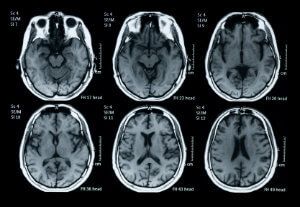
Our brains come already designed for happiness. We have caregiving systems in place for eye contact, touch, and vocalizations to let others know we are trustworthy and secure .
Our brains also regulate chemicals like oxytocin.
People who have more oxytocin trust more readily, have increased tendencies towards monogamy, and exhibit more caregiving behavior. These behaviors reduce stress which lowers production of hormones like cortisol and inhibits the cardiovascular response to stress (Kosfeld et al., 2005).
The following TED talk provides an insight into how we can overcome our negative mental patterns:
If happiness has little to do with having too many resources, then it is an inner state that we have the power to cultivate. The above video even offers specific exercises for you to try. Just by doing them, you are actively re-wiring your brain towards calm and happy sensations.
Meanwhile, this TED talk gives a better understanding of how to wire your brain to accept the positivity and happiness in your life:
The negativity bias that Dr. Rick Hanson discusses can help us understand how we can activate and “install” positive thinking as part of our core brain chemistry. If you don’t have a moment to watch either of these videos now, make time for it later—they are rich with relevant data and tips.

17 Exercises To Increase Happiness and Wellbeing
Add these 17 Happiness & Subjective Well-Being Exercises [PDF] to your toolkit and help others experience greater purpose, meaning, and positive emotions.
Created by Experts. 100% Science-based.
Happiness is the overall subjective experience of our positive emotions. There are many factors which influence our happiness, and ongoing research continues to uncover what makes us happiest.
This global pursuit of happiness has resulted in measures such as the World Happiness Report, while the World Happiness Database is working to collaborate and consolidate the existing happiness pursuits of different nations.
We are living in a time when the conditions for happiness are known. This can be disheartening at times when there is much negativity in the world.
There is, however, good news in this situation: neuroplasticity.
The human brain is wired for happiness and positive connections with others. It is actually possible to experience and learn happiness despite what has been genetically hardwired.
In a world where the focus on happiness is growing and the mirror is turning back towards ourselves, the happiness of the world relies on the happiness within each one of us and how we act, share, and voice the importance of happiness for everyone.
What are the steps you are taking to make yourself and others happier? Let us know by leaving a comment below!
We hope you enjoyed reading this article. Don’t forget to download our three Happiness Exercises for free .
- Carter, T. J., & Gilovich, T. (2010). The relative relativity of material and experiential purchases. Journal of Personality and Social Psychology , 98 (1), 146.
- Fang, S., Galambos, N. L., Johnson, M. D., & Krahn, H. J. (2018). Happiness is the way: Paths to civic engagement between young adulthood and midlife. International Journal of Behavioral Development, 42 (4), 425–433.
- Fisher, C. D. (2010). Happiness at work. International Journal of Management Reviews , 12 (4), 384–412.
- Florentine, E. (2016, July 1). 11 Scientific facts about happiness. Bustle . Retrieved from https://www.bustle.com/articles/169675-11-scientific-facts-about-happiness-that-youll-want-to-know.
- Fredrickson, B. L., Mancuso, R. A., Branigan, C., & Tugade, M. M. (2000). The undoing effect of positive emotions . Motivation and Emotion , 24 (4), 237–258.
- Happify Daily. (n.d.). What is the science of happiness? Retrieved from https://www.happify.com/hd/what-is-the-science-of-happiness/.
- Hefferon, K., & Boniwell, I. (2011). Positive psychology: Theory, research, and applications . Open University Press.
- Helliwell, J., Layard, R., & Sachs, J. (2013) . World happiness report 2013. United Nations.
- Kahneman, D., & Deaton, A. (2010). High income improves evaluation of life but not emotional well-being. Proceeding of the National Academy of Sciences , 107 (38), 16489–16493.
- Kelly, A. (2012) Gross national happiness in Bhutan: the big idea from a tiny state that could change the world. The Guardian . Retrieved from: http://www.theguardian.com/world/2012/dec/01/bhutan-wealth-happiness-counts?CMP=share_btn_link
- Kosfeld, M., Heinrichs, M., Zak, P. J., Fischbacher, U., & Fehr, E. (2005). Oxytocin increases trust in human s . Nature , 435 (7042), 673–676.
- Krause, N., Ironson, G., & Hill, P. (2018). Religious involvement and happiness: Assessing the mediating role of compassion and helping others. The Journal of Social Psychology , 158 (2), 256–270.
- Lyubomirsky, S., Sheldon, K. M., & Schkade, D. (2005). Pursuing happiness: The architecture of sustainable change. Review of General Psychology, 9 (2), 111–131.
- Maguire, E., Gadian, D., Johnsrude, I., Good, C., Ashburne, J., Frackowiak, R., & Frith, C. (2000). Navigation-related structural change in the hippocampi of taxi drivers . Proceedings of the National Academy of Sciences , 97(8), 4398-4403.
- Maslow, A. H. (1943). A theory of human motivation . Psychological Review , 50 (4), 370.
- Mauss, I. B., Savino, N. S., Anderson, C. L., Weisbuch, M., Tamir, M., & Laudenslager, M. L. (2012). The pursuit of happiness can be lonely. Emotion, 12 (5), 908–912.
- Mohun, J. (2012) The economics book . DK.
- Nelson, S. K., Layous, K., Cole, S. W., & Lyubomirsky, S. (2016). Do unto others or treat yourself? The effects of prosocial and self-focused behavior on psychological flourishing. Emotion, 16 (6), 850–861.
- Newman, K. M. (2015, July 28). Six ways happiness is good for your health . Greater Good Magazine . Retrieved from https://greatergood.berkeley.edu/article/item/six_ways_happiness_is_good_for_your_health
- Rodas, M. A., Ahluwalia, R., & Olson, N. J. (2018). A path to more enduring happiness: Take a detour from specific emotional goals. Journal of Consumer Psychology, 28 (4), 673–681.
- Rohrer, J. M., Richter, D., Brümmer, M., Wagner, G. G., & Schmukle, S. C. (2018). Successfully striving for happiness: Socially engaged pursuits predict increases in life satisfaction. Association for Psychological Science , 29 (8), 1291–1298.
- Ryan, R. M., & Deci, E. L. (2001). On happiness and human potentials: A review of research on hedonic and eudaimonic well-being. Annual Reviews Psychology, 52 , 141–66.
- Ryff, C. D., & Singer, B. H. (2006). Know Thyself and Become What You Are: A Eudemonic approach to psychological well-being. Journal of Happiness Studies 9:13 -39, 2008.
- Schwartz, B., Ward, A., Monterosso, J., Lyubomirsky, S., White, K., & Lehman, D. R. (2002). Maximizing versus satisficing: Happiness is a matter of choice. Journal of Personality and Social Psychology , 83 (5), 1178.
- Shapiro, S. L., Carlson, L. E., Astin, J. A., & Freedman, B. (2006). Mechanisms of mindfulness. Journal of clinical psychology , 62(3), 373-386.
- Sheldon, K. M., & Lyubomirsky, (2006). Achieving Sustainable Gains in Happiness: Change your actions, not your circumstances . Journal of Happiness Studies (2006) 7:55-86.
- Uchida, Y., Takahashi, Y., & Kawahara, K. (2014). Changes in hedonic and eudaimonic well-being after a severe nationwide disaster: The case of the great east Japan earthquake . Journal of Happiness Studies, 15 , 207–221.
- United Nations General Assembly. (2013). Happiness: towards a holistic approach to development. Sixty-seventh session Agenda item 14. Retrieved from http://www.un.org/ga/search/view_doc.asp?symbol=A/67/697
- Veenhoven, R. (2000). The four qualities of life: Ordering concepts and measures of the good life . Journal of Happiness Studies , 1 , 1–39.
- Veenhoven, R. (2010). Greater happiness for a greater number: Is that possible and desirable? Journal of Happiness Studies , 11 , 605–629.
- Walsh, L. C., Boehm, J. K., & Lyubomirsky, S. (2018). Does happiness promote career success? Revisiting the evidence. Journal of Career Assessment, 26 (2), 199–219.
Share this article:
Article feedback
What our readers think.
Thank you for this beautiful well written article. I came across it during my research regarding the science of happiness. The beauty in writing this post is the power to influence souls in a positive manner many who you will not meet.
Sending some love and light to you and all those who get to read your blog.
Being in the field of Human Resource for four decades, coming across and dealing with millions of minds, after reading your article, gives a feeling that I have learnt something new today…
Thank you and congratulations for such a informative work.
God bless…
Thank you for your search light into one of the nerve center of our generation. i will like to use part of this in my upcoming book
Hello Katherine, Now reading https://positivepsychology.com/happiness/ Salute to you for enriching us. Nearly hundred of us relatives are creating an audio book for our blind uncle about life skills. Any quote from you that I can add in the document? Will be grateful. regards, Prabodh Sirur
Hi Prabodh,
Wow, that sounds like a lovely gift for your uncle! We actually have a couple of posts containing quotes about happiness, so you may want to take a look at those for some inspiration. You can find those here and here .
Hope this helps, and good luck with the audiobook!
– Nicole | Community Manager
Thanks for your article, I translated this article for a mental health lesson and I really enjoyed this article.
Thank you for this super helpful article!!
Thank You for such an Informative and Detailed Article on Science of Happiness. I am a Budding Happiness Life Coach and stumbled on this Article. This gives me more understanding of Happiness in Scientific way, with your permission, I would like to share my learning in my course. Thank You and looking forward for more such Articles. Thank You and God Bless You
Hi Srinivas, Thank you for your lovely feedback. We’re glad you liked the article. Feel free to share it with others by clicking ‘Yes’ on the ‘Was this article useful to you’ button. From there, a range of sharing options will appear. – Nicole | Community Manager
Thanks, very nice lecture and informative But I wish to know more about role of religious effects on Happiness? another thing is it ok to translate lecture to other language and share it? Regards Dr Eirebi Albogasim
Hi Dr. Albogasim, Thanks for reading. There’s quite a bit of research showing that those who practice religion tend to be happier than the general population ( here’s an article on the topic). And yes, feel free to translate and share the lecture. – Nicole | Community Manager
I stumbled on your article as I am researching on Happiness to publish my 3rd book. Thanks for sharing! A very elaborate and informative article. The “Take home message” is very encouraging. And I vouch for the neuroplasticity of the brain. We can train ourselves to be Happy. Once we change our attitude, it is easy to be Happy. I learnt how to be Happy at the age of 23. Few years back I posted an article sharing my findings on Happiness in this Linked-in forum. Please see the link for the same https://www.linkedin.com/pulse/easy-happy-ramesh-thota-pmp-cqa/ . Appreciate if you can share your views.
Let us know your thoughts Cancel reply
Your email address will not be published.
Save my name, email, and website in this browser for the next time I comment.
Related articles

Embracing JOMO: Finding Joy in Missing Out
We’ve probably all heard of FOMO, or ‘the fear of missing out’. FOMO is the currency of social media platforms, eager to encourage us to [...]

The True Meaning of Hedonism: A Philosophical Perspective
“If it feels good, do it, you only live once”. Hedonists are always up for a good time and believe the pursuit of pleasure and [...]

Happiness Economics: Can Money Buy Happiness?
Do you ever daydream about winning the lottery? After all, it only costs a small amount, a slight risk, with the possibility of a substantial [...]
Read other articles by their category
- Body & Brain (50)
- Coaching & Application (57)
- Compassion (26)
- Counseling (51)
- Emotional Intelligence (24)
- Gratitude (18)
- Grief & Bereavement (21)
- Happiness & SWB (40)
- Meaning & Values (26)
- Meditation (20)
- Mindfulness (45)
- Motivation & Goals (45)
- Optimism & Mindset (34)
- Positive CBT (29)
- Positive Communication (20)
- Positive Education (47)
- Positive Emotions (32)
- Positive Leadership (18)
- Positive Parenting (4)
- Positive Psychology (33)
- Positive Workplace (37)
- Productivity (17)
- Relationships (46)
- Resilience & Coping (37)
- Self Awareness (21)
- Self Esteem (38)
- Strengths & Virtues (32)
- Stress & Burnout Prevention (34)
- Theory & Books (46)
- Therapy Exercises (37)
- Types of Therapy (64)

- Comments This field is for validation purposes and should be left unchanged.
3 Happiness Exercises Pack [PDF]
- Skip to main content
- Keyboard shortcuts for audio player
Consider This from NPR

- LISTEN & FOLLOW
- Apple Podcasts
- Google Podcasts
- Amazon Music
Your support helps make our show possible and unlocks access to our sponsor-free feed.
The Key To Happiness, According To A Decades-Long Study

Sending a text to a friend can bring a smile to your face. Now, research suggests it could also help bring long-term health benefits. guoya/Getty Images hide caption
Sending a text to a friend can bring a smile to your face. Now, research suggests it could also help bring long-term health benefits.
If you could change one thing in your life to become a happier person — like your income, a job, your relationships or your health — what would make the biggest difference? That's the question Harvard psychiatrist Dr. Robert Waldinger has been attempting to answer through decades of research. He's the director of "the world's longest-running scientific study of happiness," and he spoke with Ari Shapiro about the factor that appears to make the biggest difference in people's lives. Waldinger is a co-author of The Good Life: Lessons from the world's longest scientific study of happiness . In participating regions, you'll also hear a local news segment to help you make sense of what's going on in your community. Email us at [email protected] .
This episode was produced by Lee Hale and Megan Lim. It was edited by William Troop and Christopher Intagliata. Our executive producer is Sami Yenigun.
Psychology of Happiness in the World Essay
Psychology of happiness, or positive psychology, is a recent research field that is dedicated to the analysis of strategies that allow people to improve their lives and fill them in with meaningfulness. Although the discipline is a relatively new branch of science, it has managed to gain recognition, along with other approaches to treating mental illnesses. Psychology of happiness touches on various fields of social and cultural life and seeks to interfere with the lives of individuals for improving their talents and endowing their normal existence with greater meaning.
Although the concept of happiness is associated with emotion, its importance for the individual’s physical and psychological welfare is enormous. The analysis of virtues, talents, strengths, pleasure, and values are indispensable to define what people should do to encounter positive experience and relationships. Because many nations face a growing challenge of depression, the treatment strategies should not only focused on eliminating the mental disorder, but also fulfilling people’s life with greater pleasure and meaning.
Within a global perspective, there are a great number of models, frameworks, and theories that are focused on understanding and promoting happiness and well-being, as well as on predicting factors that influence this state. In contrast to the traditional treatment of depression and stress disorders, positive psychology is a complementary science that enhances clinical psychology (Carr, 2004 p. 2). There are three large categories classifying happiness from a psychological perspective – meaningful life, good life, and pleasant life.
All these aspects are incorporated in temporal characteristics, referring to present, past, and future (Carr, 2004). Thus, the future is associated with such positive emotions as hope, faith, optimism, and trust. Past time refers to such emotional realms as contentment, fulfillment, pride, satisfaction, and serenity (Carr, 2004). Finally, the happiness of the present is premised on momentary pleasures and gratifications. Within the perspective of psychological treatment, positive emotions directly relate to the personality trait analysis, which is an inherent component of happiness.
To define the level of happiness of people around the world, Carr (2004) has examined over 900 surveys of life satisfaction, happiness, and subjective well-being among people from 45 nations. According to these studies, minority groups, including the African nation, have been scaled as the unhappiest ones due to the social, racial, and political pressures.
As per gender, “more women and young people report extreme happiness and extreme misery compared with men and older people” (Carr, 2004, p. 6). The research on the dependence between age and happiness rates have discovered that the older a person is, the fewer fluctuations of happiness aspects have been observed.
In the studies presented by Seligman and Reichenberg (2007), positive psychology seeks to reduce depression in individuals who have a slight level of emotional pressure. Therefore, health care professionals should realize the strengths and benefits of these models for treating people and complementing depression therapy. Moreover, psychologists should take into consideration various dimensions embracing the concept of happiness among people in various nations.
For instance, western civilization is more concerned with the material values, marriage, and personality, whereas eastern civilizations focus on religion, justice, and group welfare. All these aspects should be evaluated about age, gender, and social position. Positive psychology that emphasizes self-betterment made American society perceive the pursuit of happiness an industry. However, these aspects are not typical of other nations, such as Arab society.
In the United Arab Emirates, like in other Eastern countries, the concept of happiness is associated with peculiar concepts, virtues, and values. Because the UAE population refers to the Eastern culture, their outlook on happiness is connected with social group values, including traditions, cultural values. Therefore, they are less interested in developing such concepts as self-esteem, self-determination, and self-worth (Plante, 2010).
All these issues are integral components complementing the concept of happiness of each irrespective of culture. Because Islam dominates the UAE society, its comprehensive system guides individuals into the happiness that premised on reconciliation and tranquility (Plante, 2010). To become happy, people should be fully committed to religion.
It has been proved that different cultures have different means of expressive their positive and negative emotions. Recent researches have discovered that women in the UAE tend to be more concerned with facial problems. To achieve happiness, they are in constant pursuit of beauty due to the emergence of exaggerated standards of beauty.
In case women do not look beautiful, they feel depressed and unhappy. Therefore, cosmetic procedures have become part of psychological enhancement (Plante, 2010). It is also a means of boosting self-esteem. Focus on physical improvement makes people much happier, which is not typical of the representatives of the UAE community because it has always been made on spiritual fulfillment rather than material.
The influence of globalization and consumerist culture plays a significant role in establishing ways of achieving the aspects of positive emotions. The evident connection between physical improvement and psychological development creates new perspectives for treating mental illnesses and depression.
The quality of life constitutes another perspective affecting the psychology of happiness among UAE people. Although social position might have nothing common with the emotional development of individuals, it still serves as a construct for shaping a specific outlook on happiness (Plante, 2010). For instance, poor people do not associate happiness with material values because they are not available to them. As a result, their positive psychological dimension is directing at exercising spirituality.
About the new perspectives of psychological development and treatment, the United Arab Emirates professionals focus on new, unconventional strategies in the sphere of clinical psychology. Because rapid economic development touches on families and communities in the region, the positive psychology should be oriented on smoothing this transition and creating a psychologically friendly environment to link traditional values with the contemporary expectations (Plante, 2010). Finally, the UAE community belongs to the Asian mentality and, therefore, their positive psychology differs much from that practiced in the Western world.
In conclusion, the positive psychology, or psychology of happiness, has recently emerged as a discipline and science that seeks to improve the lives of individuals and fill them in with new meaning. Therefore, it does not only relate to the traditional purposes of clinical psychology but focuses on new complementing techniques of improving and enriching individuals’ lives.
The emerged models in psychology – a good life, meaningful life, and pleasant life – have broadened theoretical and empirical studies and discovered new mechanisms of treating mental disorders. Positive emotions are differently presented in various cultures. Hence, it has been proved that people in Western society are more concerned with improving their self-esteem and achieving success in a career. In contrast, Eastern societies, including the United Arab Emirates, are oriented on traditional values, religion, and commitment to social welfare.
Carr, A. (2004). Positive Psychology: The Science of Happiness and Human Strengths . US: Psychology Press.
Plante, T. G. (2010). Contemplative Practices in Action: Spirituality, Mediation, and Health . US: ABC-CLIO.
Seligman, L., & Reichenberg, L. W. (2007). Selecting Effective Treatments: A Comprehensive, Systemic Guide to Treating Mental Disorders . US: John Wiley & Sons.
- Chicago (A-D)
- Chicago (N-B)
IvyPanda. (2022, May 3). Psychology of Happiness in the World. https://ivypanda.com/essays/psychology-of-happiness/
"Psychology of Happiness in the World." IvyPanda , 3 May 2022, ivypanda.com/essays/psychology-of-happiness/.
IvyPanda . (2022) 'Psychology of Happiness in the World'. 3 May.
IvyPanda . 2022. "Psychology of Happiness in the World." May 3, 2022. https://ivypanda.com/essays/psychology-of-happiness/.
1. IvyPanda . "Psychology of Happiness in the World." May 3, 2022. https://ivypanda.com/essays/psychology-of-happiness/.
Bibliography
IvyPanda . "Psychology of Happiness in the World." May 3, 2022. https://ivypanda.com/essays/psychology-of-happiness/.
- Principle of Observation
- Similarity/Complementarity
- Harmful Help: The Costs of Backing-up Behavior in Teams
- Being a Caregiver: Benefits and Difficulties
- "La Vita E' Bella" by Roberto Benigni Film Analysis
- Salem Cigarettes Ads and Rhetorical Appeals
- Military Career: Human Resource Certification
- Language Influences on Communication
- Complementary Conflict Patterns in Families
- "Three-Part Harmony of Adult Learning" by Kyle Moore
- Memory Chart Stages in Psychology
- Malingering and Denial in Psychology
- Importance of Sleep - Psychology
- Mood and Stress Psychology: Causes, Effects and Treatments
- Typology of Psychological Disorders and Their Treatment
The science of happiness comes under examination
Psychology has undergone serious upheaval over the last decade, as researchers realized that many studies were unreliable and unrepeatable.

We all want to be happy — and for decades, psychologists have tried to figure out how we might achieve that blissful state. The field’s many surveys and experiments have pointed to a variety of approaches, from giving stuff away to quitting Facebook to forcing one’s face into a toothy grin.
But psychology has undergone serious upheaval over the last decade, as researchers realized that many studies were unreliable and unrepeatable. That has led to a closer scrutiny of psychological research methods, with the study of happiness no exception. So — what really makes us happy? Under today’s more careful microscope, some routes to happiness seem to hold up, while others appear not to, or have yet to re-prove themselves. Here’s what we know so far, and what remains to be reassessed, according to a new analysis in the Annual Review of Psychology .
One long-standing hypothesis is that smiling makes you feel happier. In a classic 1988 study, researchers asked 92 Illinois undergraduates to hold a felt tip pen in their mouth either with their teeth, forcing an unnatural grin, or with their lips, making them pout. The students then looked at four examples of The Far Side comics. On average, those with the forced smiles found the one-panel comics slightly funnier than those with the forced pouts. But when 17 different research labs got together to retest the pen-clench smile’s effects on 1,894 new participants, the finding failed to hold up, the researchers reported in 2016.
The repetition study was part of a broader effort to counter psychology’s reproducibility crisis, which in part has been attributed to the variety of ways in which researchers could examine and reanalyze their data until they arrived at publishable results. “It’s kind of like shooting a bunch of arrows at the wall and drawing the bullseye on after,” says Elizabeth Dunn, a social psychologist at the University of British Columbia in Vancouver and coauthor of the new Annual Review of Psychology paper.
One solution has been for scientists to publicly declare, or preregister, their analysis plans before they conduct their experiments. In other words, they draw the bullseye first. Dunn and her graduate student, Dunigan Folk, homed in on such preregistered studies in their analysis, which narrowed the vast field of happiness research to just 48 published papers. Even that small number is encouraging, says Brian Nosek, a psychologist at the University of Virginia in Charlottesville and executive director of the Center for Open Science, which aims to improve research reproducibility. “I was actually surprised that there were as many papers that qualified,” he says. “That really demonstrates that this area of research has adopted a lot of these new rigor-enhancing practices.”

Preregistration alone doesn’t guarantee that results will be correct, nor does it solve all of psychology’s reproducibility problems. Quality studies also require sound methods and large and diverse sets of participants, for example. And indeed, most of the papers reviewed were high quality in those features beyond just preregistration, Dunn says. Even under the regimen of renewed scrutiny, some of the paths to happiness held up, the researchers found — including practicing gratitude, acting sociable and spending money on other people.
Take gratitude. In one of the recent studies, researchers asked hundreds of parents to either write about how they spent their week, or pen a gratitude letter to someone they knew. Expressing gratitude resulted in more positive moods. In another recent study, scientists asked more than 900 undergraduates to express gratitude in letters, texts or social media, or to list their daily activities. Those in the gratitude group scored as happier and more satisfied with their lives the following day. In both cases, it’s unclear how long these effects would persist.
Three different preregistered studies pointed to sociability as beneficial. In one, scientists assigned 71 adults to act extroverted — “bold, talkative, outgoing, active and assertive” — for a week, and another 76 to be “unassuming, sensitive, calm, modest and quiet.” Participants in the extroverted condition reported better moods during the study week, though the benefits were less for those who were naturally introverted.
And surprise! Smiling to promote happiness was also supported by new, preregistered research — once scientists switched to more natural grins. About two dozen labs from 19 different countries worked together to test the instruction to grip a pen in the teeth or to mimic the expression of a smiling person in nearly 4,000 subjects. The pen clenching still didn’t work, but people who were told to copy a smile did report better moods. Remarkably, this was true even if the subjects didn’t believe it would work, another team reported in 2023.
Researchers have also found that external agencies can promote people’s happiness. Giving people cash promoted life satisfaction, as did workplace interventions such as naps .
Dunn cautions, however, that participation in preregistered studies tends to yield small effects on happiness overall, in part because scientists can’t massage the data to get bigger numbers. If the interventions were a diet program, she says, users might drop about four pounds.
Nice ideas, poor results
Other well-known happiness approaches haven’t measured up to Dunn and Folk’s standards — at least, not yet. The researchers didn’t find clear evidence of benefits for volunteering, performing random acts of kindness or meditation . For example, a recent, preregistered study asked participants to perform acts of kindness for others, or for themselves, or simply to list what they did each day. Being kind to others over a four-week period made no difference to well-being.
Dunn and Folk didn’t find any preregistered studies at all on exercising or spending time in nature, two oft-recommended strategies. That doesn’t mean those strategies don’t or can’t work, Dunn says — just that as the preregistered landscape now stands, research hasn’t weighed in. The pair considered only two preregistered studies on meditation, and did not include meditation research on people with diagnosed mental health problems.
Such rigor is admirable, but it also means one can miss things, says Simon Goldberg, a psychologist at the University of Wisconsin-Madison. He studies the effects of meditation, including research among people who have psychological problems such as depression and anxiety. He noted that because of Dunn and Folk’s strict criteria, they omitted hundreds of studies on meditation’s benefits. “It’s, in the spirit of rigor, throwing lots of babies out with the bathwater,” he says. “It’s really very obvious that meditation training reduces symptoms of anxiety and depression.”
Dunn agrees that the review only covered the tip of the iceberg of happiness research. But that tip should expand as more psychologists preregister their science as part of what some call a renaissance in the field. As Dunn and Folk conclude, “happiness research stands on the brink of an exciting new era.”
This article originally appeared in Knowable Magazine , a non-profit publication dedicated to making scientific knowledge available to everyone.
Sign up for our weekly newsletter to get more English-language news coverage from EL PAÍS USA Edition
More information

What does sadness sound like? The ‘key’ is in 18th century opera

How to prevent midlife loneliness from getting you down
- Francés online
- Inglés online
- Italiano online
- Alemán online
- Crucigramas & Juegos

Thank you for visiting nature.com. You are using a browser version with limited support for CSS. To obtain the best experience, we recommend you use a more up to date browser (or turn off compatibility mode in Internet Explorer). In the meantime, to ensure continued support, we are displaying the site without styles and JavaScript.
- View all journals
- Explore content
- About the journal
- Publish with us
- Sign up for alerts
- Perspective
- Published: 26 February 2018
Expanding the social science of happiness
- John F. Helliwell ORCID: orcid.org/0000-0001-7963-6420 1 &
- Lara B. Aknin 2
Nature Human Behaviour volume 2 , pages 248–252 ( 2018 ) Cite this article
2416 Accesses
53 Citations
32 Altmetric
Metrics details
- Social evolution
- Social policy
A Publisher Correction to this article was published on 19 March 2018
This article has been updated
Valid and reliable self-report happiness scales have prompted a wellspring of research into the causes and consequences of human happiness, allowing researchers from across the social sciences to empirically address questions that were previously treated more theoretically in the social sciences, religion and philosophy. As this body of knowledge accumulates, we see a need for the study of happiness to be more social in both content and methodology. Specifically, we argue for a social science of happiness that further recognizes the importance of social connection and prosocial action for human well-being, and invests in greater collaboration across all disciplinary boundaries, especially among social scientists and policymakers. As a larger and stronger social science of happiness emerges, it both requires and is supported by a corresponding shift in policy from identifying and fixing problems to finding positive ways to promote well-being.
This is a preview of subscription content, access via your institution
Access options
Access Nature and 54 other Nature Portfolio journals
Get Nature+, our best-value online-access subscription
24,99 € / 30 days
cancel any time
Subscribe to this journal
Receive 12 digital issues and online access to articles
111,21 € per year
only 9,27 € per issue
Buy this article
- Purchase on Springer Link
- Instant access to full article PDF
Prices may be subject to local taxes which are calculated during checkout
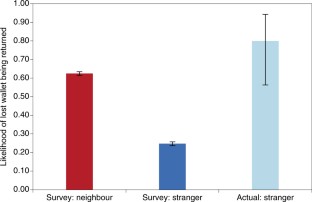

Similar content being viewed by others

Worldwide divergence of values
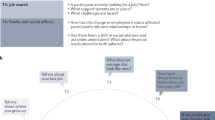
Interviews in the social sciences

People are surprisingly hesitant to reach out to old friends
Change history, 19 march 2018.
In the version of this Perspective originally published, both authors were incorrectly indicated as being at both affiliations 1 and 2. However, John F. Helliwell is only affiliated with the 1 University of British Columbia and Lara B. Aknin is only affiliated with 2 Simon Fraser University. This has now been corrected.
McMahon, D. M. Happiness: A History (Atlantic Monthly Press, New York, NY, 2006).
Diener, E., Oishi, S. & Tay, L. Advances in subjective well-being research. Nat. Hum. Behav . https://doi.org/10.1038/s41562-018-0307-6 (2018).
Diener, E. Subjective well-being. Psychol. Bull. 95 , 542–575 (1984).
Kahneman, D., Krueger, A. B., Schkade, D. A., Schwarz, N. & Stone, A. A. A survey method for characterizing daily life experience: the day reconstruction method. Science 306 , 1776–1780 (2004).
Killingsworth, M. A. & Gilbert, D. T. A wandering mind is an unhappy mind. Science 330 , 932–932 (2010).
Diener, E. & Seligman, M. E. Very happy people. Psychol. Sci. 13 , 81–84 (2002).
Helliwell, J. F., Huang, H. & Harris, A. in New and Enduring Themes in Development Economics (eds Ray, T., Somanathan, E. & Dutta, B.) 3–40 (World Scientific, Singapore, 2009).
Maslow, A. H. A theory of human motivation. Psychol. Rev. 50 , 370–396 (1943).
Helliwell, J. F. & Barrington‐Leigh, C. P. Measuring and understanding subjective well‐being. Can. J. Econ. 43 , 729–753 (2010).
Helliwell, J. F. & Wang, S. Weekends and subjective well-being. Soc. Indic. Res. 116 , 389–407 (2014).
Helliwell, J. F. & Wang, S. How was your weekend? How the social context underlies weekend effects in happiness and other emotions for US workers. PLoS ONE 10 , e0145123 (2015).
Baumeister, R. F. & Leary, M. R. The need to belong: desire for interpersonal attachments as a fundamental human motivation. Psychol. Bull. 117 , 497–529 (1995).
Ryan, R. M. & Deci, E. L. Self-determination theory and the facilitation of intrinsic motivation, social development, and well-being. Am. Psychol. 55 , 68–78 (2000).
Helliwell, J. F., Huang, H. & Wang, S. in The Oxford Handbook of Social and Political Trust (ed. Uslander, E. M.) 409–446 (Oxford Univ. Press, New York, NY, 2017).
Coan, J. A., Schaefer, H. S. & Davidson, R. J. Lending a hand: social regulation of the neural response to threat. Psychol. Sci. 17 , 1032–1039 (2006).
Medalie, J. H. & Goldbourt, U. Angina pectoris among 10,000 men: II. Psychosocial and other risk factors as evidenced by a multivariate analysis of a five-year incidence study. Am. J. Med. 60 , 910–921 (1976).
Cohen, S., Doyle, W. J., Skoner, D. P., Rabin, B. S. & Gwaltney, J. M. Social ties and susceptibility to the common cold. JAMA 277 , 1940–1944 (1997).
Cohen, S., Doyle, W. J., Turner, R., Alper, C. M. & Skoner, D. P. Sociability and susceptibility to the common cold. Psychol. Sci. 14 , 389–395 (2003).
Aldrich, D. P. Social, not physical, infrastructure: the critical role of civil society after the 1923 Tokyo earthquake. Disasters 36 , 398–419 (2012).
Yamamura, E., Tsutsui, Y., Yamane, C., Yamane, S. & Powdthavee, N. Trust and happiness: comparative study before and after the Great East Japan Earthquake. Soc. Indic. Res. 123 , 919–935 (2015).
Aldrich, D. P. The externalities of strong social capital: post-tsunami recovery in Southeast India. J. Civ. Soc. 7 , 81–99 (2011).
Miller, D. T. The norm of self-interest. Am. Psychol. 54 , 1053–1060 (1999).
Fehr, E. & Schmidt, K. M. Fairness, incentives, and contractual choices. Eur. Econ. Rev. 44 , 1057–1068 (2000).
Hobbes, T. in Classics of Moral and Political Theory (ed. Morgan, M.) 575 (Hackett Publishing Company, Indianapolis, IN/Cambridge, MA, 2011).
Zaki, J. & Mitchell, J. P. Intuitive prosociality. Curr. Dir. Psychol. Sci. 22 , 466–470 (2013).
Brownell, C. A. Early development of prosocial behavior: current perspectives. Infancy 18 , 1–9 (2013).
Warneken, F. & Tomasello, M. Altruistic helping in human infants and young chimpanzees. Science 311 , 1301–1303 (2006).
Warneken, F., Hare, B., Melis, A. P., Hanus, D. & Tomasello, M. Spontaneous altruism by chimpanzees and young children. PLoS Biol. 5 , e184 (2007).
Hepach, R., Haberl, K., Lambert, S. & Tomasello, M. Toddlers help anonymously. Infancy 22 , 130–145 (2017).
Hepach, R. Prosocial arousal in children. Child Dev. Perspect. 11 , 50–55 (2017).
Hepach, R., Vaish, A. & Tomasello, M. Young children are intrinsically motivated to see others helped. Psychol. Sci. 23 , 967–972 (2012).
Garon, N., Bryson, S. E. & Smith, I. M. Executive function in preschoolers: a review using an integrative frame-work. Psychol. Bull. 134 , 31–60 (2008).
Hamlin, J. K., Wynn, K. & Bloom, P. Social evaluation by preverbal infants. Nature 450 , 557–559 (2007).
Hamlin, J. K., Wynn, K. & Bloom, P. Three‐month‐olds show a negativity bias in their social evaluations. Dev. Sci. 13 , 923–929 (2010).
List, J. A. Why economists should conduct field experiments and 14 tips for pulling one off. J. Econ. Perspect. 25 , 3–15 (2011).
Brethel-Haurwitz, K. M. & Marsh, A. A. Geographical differences in subjective well-being predict extraordinary altruism. Psychol. Sci. 25 , 762–771 (2014).
Koo, M. & Fishbach, A. Giving the self: increasing commitment and generosity through giving something that represents one’s essence. Soc. Psychol. Personal. Sci. 7 , 339–348 (2016).
Henrich, J. et al. “Economic man” in cross-cultural perspective: behavioral experiments in 15 small-scale societies. Behav. Brain Sci. 28 , 795–815 (2005).
Bouwmeester, S. et al. Registered replication report: Rand, Greene, and Nowak (2012). Perspect. Psychol. Sci. 12 , 527–542 (2017).
Rand, D. G. Reflections on the time-pressure cooperation registered replication report. Perspect. Psychol. Sci. 12 , 543–547 (2017).
Rand, D. G., Greene, J. D. & Nowak, M. A. Spontaneous giving and calculated greed. Nature 489 , 427–430 (2012).
Yamagishi, T. et al. Response time in economic games reflects different types of decision conflict for prosocial and proself individuals. Proc. Natl Acad. Sci. USA 114 , 6394–6399 (2017).
Crockett, M. J., Kurth-Nelson, Z., Siegel, J. Z., Dayan, P. & Dolan, R. J. Harm to others outweighs harm to self in moral decision making. Proc. Natl Acad. Sci. USA 111 , 17320–17325 (2014).
Harbaugh, W. T., Mayr, U. & Burghart, D. R. Neural responses to taxation and voluntary giving reveal motives for charitable donations. Science 316 , 1622–1625 (2007).
Moll, J. et al. Human fronto-mesolimbic networks guide decisions about charitable donation. Proc. Natl Acad. Sci. USA 103 , 15623–15628 (2006).
Park, S. Q. et al. A neural link between generosity and happiness. Nat. Commun. 8 , 15964 (2017).
Dunn, E. W., Aknin, L. B. & Norton, M. I. Spending money on others promotes happiness. Science 319 , 1687–1688 (2008).
Dunn, E. W., Aknin, L. B. & Norton, M. I. Prosocial spending and happiness: Using money to benefit others pays off. Curr. Dir. Psychol. Sci. 23 , 41–47 (2014).
Aknin, L. B. et al. Prosocial spending and well-being: cross-cultural evidence for a psychological universal. J. Pers. Soc. Psychol. 104 , 635–652 (2013).
Aknin, L. B., Broesch, T., Hamlin, K. J. & Van de Vondervoort, J. W. Prosocial behaviour leads to happiness in a small-scale rural society. J. Exp. Psychol. Gen. 144 , 788–795 (2015).
Aknin, L. B., Van de Vondervoort, J. W. & Hamlin, J. K. Positive feelings reward and promote prosocial behavior. Curr. Opin. Psychol. 20 , 55–59 (2018).
Aknin, L. B., Hamlin, J. K. & Dunn, E. W. Giving leads to happiness in young children. PLoS ONE 7 , e39211 (2012).
Helliwell, J. F., Huang, H. & Wang, S. in WorldHappiness Report 2017 (eds Helliwell, J. F., Layard, R. & Sachs, J.) Ch. 2 (Sustainable Development Solutions Network, 2017).
Warneken, F. & Tomasello, M. Extrinsic rewards undermine altruistic tendencies in 20-month-olds. Dev. Psychol. 44 , 1785–1788 (2008).
Lepper, M. R., Greene, D. & Nisbett, R. E. Undermining children’s intrinsic interest with extrinsic reward: a test of the “overjustification” hypothesis. J. Pers. Soc. Psychol. 28 , 129–137 (1973).
von Dawans, B., Fischbacher, U., Kirschbaum, C., Fehr, E. & Heinrichs, M. The social dimension of stress reactivity: acute stress increases prosocial behavior in humans. Psychol. Sci. 23 , 651–660 (2012).
Pistrang, N., Jay, Z., Gessler, S. & Barker, C. Telephone peer support for women with gynaecological cancer: benefits and challenges for supporters. Psychooncology 22 , 886–894 (2013).
Seligman, M. E. & Adler, A. in Global Happiness Policy Report (ed. Global Happiness Council) Ch. 4, 53–74 (Sustainable Development Solutions Network, 2018).
Helliwell, J. F. & Putnam, R. D. The social context of well-being. Philos. Trans. R. Soc. London Ser. B 359 , 1435–1446 (2004).
Bernstein, A. Link the world’s best investigators. Nature 496 , 27 (2013).
Oreopoulos, P. & Petronijevic, U. Student coaching: How far can technology go? J. Hum. Res. https://doi.org/10.3368/jhr.53.2.1216-8439R (2017).
Balliet, D. Communication and cooperation in social dilemmas: a meta-analytic review. J. Conflict Resolut. 54 , 39–57 (2010).
Ostrom, E. Collective action and the evolution of social norms. J. Econ. Perspect. 14 , 137–158 (2000).
Börner, K. et al. A multi-level systems perspective for the science of team science. Sci. Trans. Med . 2 , 49cm24 (2010).
Helliwell, J. F. Institutions as enablers of wellbeing: The Singapore prison case study. Int. J. Well Being 1 , 255–265 (2011).
Nilson, C. Canada’s Hub model: calling for perceptions and feedback from those clients at the focus of collaborative risk-driven intervention. J. Community Saf. Well Being 1 , 58–60 (2016).
Diener, E., Pressman, S. D., Hunter, J. & Delgadillo‐Chase, D. If, why, and when subjective well‐being influences health, and future needed research. Appl. Psychol. Health Well Being 9 , 133–167 (2017).
Fredrickson, B. L. The broaden-and-build theory of positive emotions. Philos. Trans. R. Soc. London Ser. B 359 , 1367–1377 (2004).
Isen, A. M., Daubman, K. A. & Nowicki, G. P. Positive affect facilitates creative problem solving. J. Pers. Soc. Psychol. 52 , 1122–1131 (1987).
Fredrickson, B. L. The role of positive emotions in positive psychology: The broaden-and-build theory of positive emotions. Am. Psychol. 56 , 218–226 (2001).
Lyubomirsky, S., King, L. & Diener, E. The benefits of frequent positive affect: Does happiness lead to success? Psychol. Bull. 131 , 803–855 (2005).
Baumeister, R. F., Bratslavsky, E., Finkenauer, C. & Vohs, K. D. Bad is stronger than good. Rev. Gen. Psychol. 5 , 323–370 (2001).
Helliwell, J. F. & Wang, S. in World Happiness Report (eds Helliwell, J. F., Layard, R. & Sachs, J.) Ch. 2 (Sustainable Development Solutions Network, 2012).
Nickerson, R. S. Confirmation bias: a ubiquitous phenomenon in many guises. Rev. Gen. Psychol. 2 , 175–220 (1998).
Bilalić, M., McLeod, P. & Gobet, F. Inflexibility of experts — reality or myth? Quantifying the Einstellung effect in chess masters. Cogn. Psychol. 56 , 73–102 (2008).
Wallsten, T. S. Physician and medical student bias in evaluating diagnostic information. Med. Decis. Making 1 , 145–164 (1981).
Wuchty, S., Jones, B. F. & Uzzi, B. The increasing dominance of teams in production of knowledge. Science 316 , 1036–1039 (2007).
Uzzi, B., Mukherjee, S., Stringer, M. & Jones, B. Atypical combinations and scientific impact. Science 342 , 468–472 (2013).
OECD Guidelines on Measuring Subjective Well-being (OECD Publishing, 2013).
Helliwell, J. F., Layard, R. & Sachs, J. (eds) World Happiness Report 2017 (Sustainable Development Solutions Network, 2017).
Download references
Author information
Authors and affiliations.
Vancouver School of Economics, University of British Columbia, Vancouver, British Columbia, Canada
John F. Helliwell
Department of Psychology, Simon Fraser University, Burnaby, British Columbia, Canada
- Lara B. Aknin
You can also search for this author in PubMed Google Scholar
Contributions
J.F.H. and L.B.A. wrote and edited the manuscript.
Corresponding author
Correspondence to John F. Helliwell .
Ethics declarations
Competing interests.
The authors declare no competing interests.
Additional information
Publisher’s note: Springer Nature remains neutral with regard to jurisdictional claims in published maps and institutional affiliations.
Rights and permissions
Reprints and permissions
About this article
Cite this article.
Helliwell, J.F., Aknin, L.B. Expanding the social science of happiness. Nat Hum Behav 2 , 248–252 (2018). https://doi.org/10.1038/s41562-018-0308-5
Download citation
Received : 16 September 2017
Accepted : 22 January 2018
Published : 26 February 2018
Issue Date : April 2018
DOI : https://doi.org/10.1038/s41562-018-0308-5
Share this article
Anyone you share the following link with will be able to read this content:
Sorry, a shareable link is not currently available for this article.
Provided by the Springer Nature SharedIt content-sharing initiative
This article is cited by
- Gillian M. Sandstrom
Communications Psychology (2024)
An 8-item scale for the measurement of happiness: validation and application of the Oxford happiness questionnaire in an Italian sample
- Massimiliano Barattucci
- Agostino Brugnera
- Andrea De Giorgio
Current Psychology (2024)
Mental health among the general population and healthcare workers during the COVID-19 pandemic: A meta-analysis of well-being and psychological distress prevalence
- Ana Blasco-Belled
- Claudia Tejada-Gallardo
- Carles Alsinet
The more "similar" the happier: Augmenting text using similarity scoring with neural embeddings for happiness classification
- Kuan Shyang Yong
- Jasy Suet Yan Liew
Journal of Intelligent Information Systems (2023)
Interpersonal harmony pursuit in Japan and the United States: Culture shapes motivation and goal content
- Claudia Gherghel
- Daisuke Akamatsu
Current Psychology (2023)
Quick links
- Explore articles by subject
- Guide to authors
- Editorial policies
Sign up for the Nature Briefing newsletter — what matters in science, free to your inbox daily.
- Education Diary
- Advertising
- Privacy Policy
Class Notes NCERT Solutions for CBSE Students
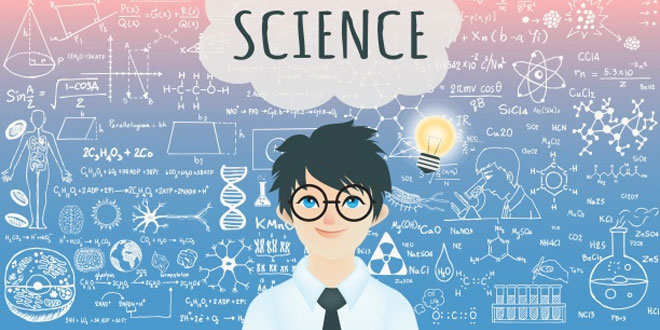
Short Essay on Science and Human Happiness
admin October 5, 2017 Essays in English 12,344 Views
Science can be called one of the greatest blessings of this age. We owe all our progress to it. It has brought everyone closer and also made life very comfortable. Today we can go round the globe in a matter of hours. We can also talk to our loved ones across the world by just pushing buttons.
Inventions such as washing machine, refrigerator, air-conditioner, dish-washer, geyser etc. Make our lives very comfortable. Television, Cinema and Compact discs have changed the entertainment industry for ever. Thousands of lives are saved every day due to the progress of medical science. No industry or office can do without computers today. In fact, computers can be called the greatest invention of modern age.
However, science has also brought a lot of misery upon man. It has created diseases such as AIDS and cancer. Nuclear weapons can destroy our planet several times over. Our moral values have also suffered damage. People think nothing less of killing others to further their own interests. Money and power are the new gods. We worship science but use it to destroy our planet and fellow beings.
It is not impossible to remove at least some of the curses of science. We must resolve to use it only to make life batter for man. We must also not pollute our planet or cut trees any more. We must not build any more arms until every man has food on his plate. In this way, we can build a world which will be happier for all of us.
- Stumbleupon
Tags Easy English Essays English Essays for 5 Class Students English Essays for 6 Class Students English Essays for 7 Class Students English Essays for 8 Class Students English Essays for CBSE Students English Essays for NCERT Students English Essays in Easy Language Essays for NCERT Syllabus Essays in English Language Popular English Essays for CBSE Students Short English Essays
Related Articles

Easter Sunday Essay in English
March 30, 2024

English essay on My Favourite Festival: Holi
March 17, 2024

Mahashivratri Essay in English: Long & Short Essay for Students
March 7, 2024

The Republic Day: Short Essay for Students and Children
January 26, 2024

Guru Nanak Dev Essay For Students and Children
November 24, 2023

Thanksgiving Day Essay in English For Students and Children
November 21, 2023

Diwali Essay For Students And Children
Diwali Essay [1] ~ 200 Words Diwali Essay: Diwali is a very important festival of …
- Website Inauguration Function.
- Vocational Placement Cell Inauguration
- Media Coverage.
- Certificate & Recommendations
- Privacy Policy
- Science Project Metric
- Social Studies 8 Class
- Computer Fundamentals
- Introduction to C++
- Programming Methodology
- Programming in C++
- Data structures
- Boolean Algebra
- Object Oriented Concepts
- Database Management Systems
- Open Source Software
- Operating System
- PHP Tutorials
- Earth Science
- Physical Science
- Sets & Functions
- Coordinate Geometry
- Mathematical Reasoning
- Statics and Probability
- Accountancy
- Business Studies
- Political Science
- English (Sr. Secondary)
Hindi (Sr. Secondary)
- Punjab (Sr. Secondary)
- Accountancy and Auditing
- Air Conditioning and Refrigeration Technology
- Automobile Technology
- Electrical Technology
- Electronics Technology
- Hotel Management and Catering Technology
- IT Application
- Marketing and Salesmanship
- Office Secretaryship
- Stenography
- Hindi Essays
- English Essays
Letter Writing
- Shorthand Dictation
Essay on “Science and Human Happiness” Complete Essay for Class 10, Class 12 and Graduation and other classes.
Science and Human Happiness
Essay No. 01
There is no doubt that science has been the greatest boon to man so far. But the achievements of science have not come to man as a ripe apple falls in the lap of a man sitting under an apple tree. Science is not just the result of observation and experience. It is, on the other hand , the result of centuries of hard work done by man, even at the risk of his own life or health.
Today, man can fly in space, he can fly in the air like birds. He can swim on the surface of the sea like fishes. He can move on the earth at tremendous speed. More recently, he can keep sitting at home and do Tele-Shopping. He can chat and learn a lot on the internet and also express his own viewpoint through e-mail.
If some outstanding scientific achievements of the twentieth century are to be mentioned, the discovery of electricity must perhaps come at the top. The electricity brings in its train innumerable devices like the fluorescent tube, the bulb, the fan, the desert cooler, the air –conditioner, the geyser etc. Even the printing presses, textile and hundreds of other mills and factories and the cinematography and computers and T.V. sets and the radio also work with electricity through the battery cells may also be used in some cases.
The most notable achievements of science are in the fields of agriculture, industry and medicine and surgery.
In the fields of medicine and surgery, literally miraculous progress has been done, what are these- the bypass surgery, ballooning, hear and kidney and bone-marrow transplant? They are nothing short of miracles.
Today, the people are greatly health conscious. Longevity has increased in most of the countries. Child mortality has been greatly reduced in number. We have so many health centers, gyms and slimming centers and nursing homes, hospitals and maternity centers.
In the field of education and dissemination of knowledge, we have the use of e-mail, e-class-rooms, better schools, new teaching and learning methods, study through cassettes and several video audio methods.
In fact man is still exploring the vast uncharted vista on the earth and in the sky. He is still trying to probe deeply into the past. Let us hope for the best.
Essay No. 02
Modem age is the age of science. Wherever we go, we find articles based on some or the other scientific formulas.
For instance, many of the students and office goers get awakened with the help of an alarm clock. The factory goers learn about the factory time through the buzzing of a hooter.
People generally go to places of work by using one or the other vehicle. The food they eat is prepared on the stove or gas oven. The clothes they wear are prepared in big factories and mills.
Science has enabled the modern man to fly in air like birds and swim in the sea like fishes. Even more than that he can even travel in space which the birds can’t do. All the modern means of travel and other devices are the inventions of science.
Some of important devices and inventions and discoveries used by the common man are electric bulb, fluorescent tube, mixer, juicer, oven, grinder, refrigerator, TV, cinema, paper, printing press, bus, car, ship, tractor, aeroplane, microscope, telescope, X-Ray, A.C, railway train, computer, telephone, telegraph system, etc.
One important discovery of science is electricity which has made the working of so many factories and mills possible.
Inventions and discoveries in agriculture and irrigation methods have enabled food for the teeming millions on earth. Means of travel and communication have become faster and cheaper. Inventions in medical science have led to longevity and reduction in the ratio of child mortality. Life has become comfortable for the common man.
About evirtualguru_ajaygour

commentscomments
Nice essay topics
Leave a Reply Cancel reply
Your email address will not be published. Required fields are marked *
Quick Links

Popular Tags
Visitors question & answer.
- Bhavika on Essay on “A Model Village” Complete Essay for Class 10, Class 12 and Graduation and other classes.
- slide on 10 Comprehension Passages Practice examples with Question and Answers for Class 9, 10, 12 and Bachelors Classes
- अभिषेक राय on Hindi Essay on “Yadi mein Shikshak Hota” , ”यदि मैं शिक्षक होता” Complete Hindi Essay for Class 10, Class 12 and Graduation and other classes.
- Gangadhar Singh on Essay on “A Journey in a Crowded Train” Complete Essay for Class 10, Class 12 and Graduation and other classes.
Download Our Educational Android Apps

Latest Desk
- Television – Shiksha aur Manoranjan ke Sadhan ke roop mein “टेलीविजन – शिक्षा और मनोरंजन के साधन के रूप में” Hindi Essay 600 Words for Class 10, 12.
- Vigyan evm Nishastrikaran “विज्ञान एवं नीतिशास्त्र” Hindi Essay 1000 Words for Class 10, 12 and Higher Classes Students.
- Vigyan Ek Accha Sewak Ya Krur Swami “विज्ञान एक अच्छा सेवक या क्रूर स्वामी” Hindi Essay 1000 Words.
- Dainik Jeevan mein Vigyan “दैनिक जीवन में विज्ञान” Hindi Essay 800 Words for Class 10, 12 and Higher Classes Students.
- Example Letter regarding election victory.
- Example Letter regarding the award of a Ph.D.
- Example Letter regarding the birth of a child.
- Example Letter regarding going abroad.
- Letter regarding the publishing of a Novel.
Vocational Edu.
- English Shorthand Dictation “East and Dwellings” 80 and 100 wpm Legal Matters Dictation 500 Words with Outlines.
- English Shorthand Dictation “Haryana General Sales Tax Act” 80 and 100 wpm Legal Matters Dictation 500 Words with Outlines meaning.
- English Shorthand Dictation “Deal with Export of Goods” 80 and 100 wpm Legal Matters Dictation 500 Words with Outlines meaning.
- English Shorthand Dictation “Interpreting a State Law” 80 and 100 wpm Legal Matters Dictation 500 Words with Outlines meaning.

SCIENCE AND HUMAN HAPPINESS: Essay Topics
SCIENCE AND HUMAN HAPPINESS
Ours is the age of science. The contribution of science to human happiness is by no means small. Borders of human knowledge have been pushed forward in all directions. Man’s working capacity, in all fields has enormously increased. It is by virtue of scientific knowledge that man has performed stupendous tasks. Man has explored the bottom of the oceans, conquered the high mountains, stepped on the moon and now hopes to set foot on the other planets also. Science has given sophisticated instruments to man for research and the deadly weapons of offence and of defence.
Transport and communication have become extremely easy. Time and distance have been almost annihilated. Radio, TV and now Internet have made it possible to know many things of the importance that happen in any part of the globe.Radio television, cinematograph provide entertainment and knowledge. Two powerful agents – steam and electricity have revolutionized the world. The two grand servants, electricity and steam have accomplished mammoth tasks for men. Electricity is working wonders. Electricity is a magic-hand maid. It has given in our hands the lamp of Aladdin; with the help of it we run our water coolers, water heaters, washing machines, refrigerators, air conditioners, radios, televisions,typewriters, printing machines, computers and numerous other important and useful machines. Science has helped save labour, time and money. Science has helped us to right against diseases. Sources of these far ‘incurable’ diseases have been successfully encountered with. Science has enabled the blinds to see, the deaf to hear, the dumb to talk, the lame to walk – science has made the birth easy, death difficult; life comfortable; pleasure more pleasant. Painless and bloodless surgery has already become a practical possibility. Sulpha drugs, streptomycin, penicillin, aspirin etc. have reduced human suffering to a great extent. Birth and death have already been brought under control. Science and life have become synonyms. Blessings of the science are numerous. We are born and we die under the shadow of science. Science is our eyes, ears, nose, throat, lungs, hands, feet and all.
Science has its darker side too. The banes and the boons of science balance each other in well-balanced pans of a scale. Science has contributed to human comforts greatly, but what is the contribution of science towards happiness? It is very doubtful as science has made life – human life ‘happy’. Not only human life but science has also made the typewriters, printing machines, computers and numerous other important and useful machines. Science has helped save labour, time and money. Science has helped us to right against diseases. Sources of these far ‘incurable’ diseases have been successfully encountered with. Science has enabled the blinds to see, the deaf to hear, the dumb to talk, the lame to walk – science has made the birth easy, death difficult; life comfortable; pleasure more pleasant. Painless and bloodless surgery has already become a practical possibility. Sulpha drugs, streptomycin, penicillin, aspirin etc. have reduced human suffering to a great extent. Birth and death have already been brought under control. Science and life have become synonyms. Blessings of the science are numerous. We are born and we die under the shadow of science. Science is our eyes, ears, nose, throat, lungs, hands, feet and all.
life of even animals, the so-called lower creation, happy. Comfort can be misnamed happiness. Science has made life happier but comfort is not happiness and comfort means the annihilation of all incentives to work. Human life has been so much mechanized that had we been able to walk about rather than being carried about, lifted about, dragged about, flown about, pushed and jolted about, and rocketed to and fro, life could have been happier. Science has turned man into machines, robots – working, eating, seeing, hearing mechanically. We have given ourselves away for this ‘sordid boon’ of science. Nothing is ours. Science has brain washed us, it has ‘brain drained’ us. We human beings are human machines. If a part of the body, human or animal, is disfigured, mutilated or amputated, “don’t worry”, the doctors say. Artificial limbs, foot, leg; arm can be attached to the body to replace the damaged one. The exterior or interior parts that cannot be manufactured synthetically or artificially, an identical part from another human being or even of an animal can be transplanted. A kidney, an eye, the liver, a lung, and even the heart can be and has also been transplanted. Science can give new hearts in place of old ones. Though science has made possible the replacement, transplantation or even exchange of heart, yet science has not been able to bring about the “change of hearts” which is essential agency which remains as ‘unfulfilled’ as ever. Here science has failed – science has failed the scientists. Science is the ethics, the religion of the atheists.
education sight
All about education
- English Essay
- Application
Science and Human Happiness - English Essay
Science and human happiness, english essay on "science and human happiness" - composition on "science and human happiness", no comments:, post a comment.

Short Essay on Science and Human Happiness
Science and Human Happiness
Introduction: Modern science has been considered a boon on mankind, because it has opened our eyes and has removed the darkness of ignorance which always led us on the wrong track.
Science has removed the age-old ideas and superstitions and has taught us how to look at things scientifically. It has taught superstitions are all wrong because it was not supported by scientific argument and observation. People in the past believed that the earth was static and the sun and the other planets revolved round it. But later scientists proved that the earth and other planets move around the sun. In this way science has brought about a total revolution in human thought and action and has totally changed our lives.
Contribution of Science in Human Life: Science has invented a number of things for for human-beings. These scientific inventions have made our lives comfortable. Today we are using electric-lights instead of candles. We are using motor-cars, fan, television, radio, air-conditioner, refrigerator, washing machine, and many other things.
Science has also invented computers, smartphones, emails and internet which have made our work very easy and comfortable. Today everything is done by the machine and man has to simply sit at home and enjoy all these facilities.
Comfort is not happiness: Happiness is a state of mind. Science has not made us happy and cannot bring happiness to us because happiness is not the same thing as comfort or luxury.
Rather the things that we are using have made us idle, dependent and mechanical. Today we are not able to do anything without science. We made the machines to serve us, but now we have become slaves to the machine and this adds to our unhappiness. Today cooking is impossible without a gas cylinder and we have no other alternative when it is exhausted or out of stock.

Thus what we find today is that life is becoming more and more mechanical in this age of science and we sincerely feel as if we are going to be strangulated by these machines. We feel that we should go back to the time when science was not there and we led a life quite independent of other things.
Dangers of Science: Again there are other things that make us more and more unhappy day by day. These include the atom bombs, the hydrogen bombs and other dangers that threaten the safety and security of our life. This is because of the misuse of science.
Conclusion: The scientific powers should be properly used in the service of humanity. Scientists should aim at inventing things that would make life smooth and safe.
Science makes human-life easier and comfortable. However, it also exposes mankind to certain risks. Happiness is an inner-feeling of pleasant emotions. Scientific discoveries should be based on humanitarian objectives.
Short Essay on Relationship between Science and Religion
Short Paragraph on Unemployment Problem in India
Abraham Lincoln: From Humble Beginnings to Legendary Leadership
Vikram Sarabhai: The Visionary Behind India’s Space Program
Essay on Mahavir Jayanti for all Class in 100 to 500 Words in English
Essay on Indian Heritage for Students and Children
Essay on Gender Equality
Eassy on Good Habits
Eassy on saving for future
Essay – My Dream
Pencil: An Essay on Pencil
Short Essay on Pencil
Comments are closed.
Welcome, Login to your account.
Recover your password.
A password will be e-mailed to you.

- How it Works
- Top Writers
Finished Papers
When shall I pay for the service taken up for the draft writing?
- Exploratory
PenMyPaper offers you with affordable ‘write me an essay service’
We try our best to keep the prices for my essay writing as low as possible so that it does not end up burning a hole in your pocket. The prices are based on the requirements of the placed order like word count, the number of pages, type of academic content, and many more. At the same time, you can be eligible for some attractive discounts on the overall writing service and get to write with us seamlessly. Be it any kind of academic work and from any domain, our writers will get it done exclusively for you with the greatest efficiency possible.

IMAGES
VIDEO
COMMENTS
These are questions that require thinking. And the answer to these lies in our following 1000-word long scholarly essay: 'Science and Human Happiness'. Then there is a short 100-word 'Science and Human Happiness Paragraph', which summarizes the subject in a few sentences. Science is constantly inventing ways and means to make people happy.
Affective state theory. To recap, this theory of happiness proposes that happiness is the result of one's overall emotional state. Bradburn (1969) put forward the argument that happiness is made up of two separate components that are quite independent and uncorrelated: positive affect and negative affect.
Science and Human Happiness. The modern age is the age of science. Wherever we go, we find articles based on some of the other scientific formulas. For instance, many of the students and office goers get awakened with the help of an alarm clock. The factory goers learn about the factory time through the buzzing of a hooter.
Positive psychology is a science of positive features of the life of a human being, including happiness, welfare, and prosperity. It stretches back in history a long way. The modern studies of happiness and ancient views on the good life relate and contrast to each other from different angles. We will write a custom essay on your topic.
Psychologists have now identified many of the tenets that help individuals along that journey. Happiness incorporates curiosity, and the ability to tolerate risk and anxiety to discover new ...
Pleasure, comfort, gratitude, hope, and inspiration are examples of positive emotions that increase our happiness and move us to flourish. In scientific literature, happiness is referred to as hedonia (Ryan & Deci, 2001), the presence of positive emotions and the absence of negative emotions. In a more broad understanding, human wellbeing is ...
Waldinger is a co-author of The Good Life: Lessons from the world's longest scientific study of happiness. In participating regions, you'll also hear a local news segment to help you make sense of ...
Psychology of Happiness in the World Essay. Psychology of happiness, or positive psychology, is a recent research field that is dedicated to the analysis of strategies that allow people to improve their lives and fill them in with meaningfulness. Although the discipline is a relatively new branch of science, it has managed to gain recognition ...
And indeed, most of the papers reviewed were high quality in those features beyond just preregistration, Dunn says. Even under the regimen of renewed scrutiny, some of the paths to happiness held up, the researchers found — including practicing gratitude, acting sociable and spending money on other people. Take gratitude.
Valid and reliable self-report happiness scales have prompted a wellspring of research into the causes and consequences of human happiness, allowing researchers from across the social sciences to ...
The four essays explore the nature of the good life, and thus happiness, and philosophy can be, or is, a means for achieving it: hence 'happiness essays'. 2. They are presented as speeches, or perhaps inter-connected soliloquies. The style of Ep, Sto, and Pl are surprisingly Non-Humean, more like ironical allusions to 'enthusiasm' (Of ...
Short Essay on Science and Human Happiness: Short English essay on Science and Human Happiness. Suitable for 5th, 6th, 7th, 8th and 9th class CBSE students. Friday , April 12 2024
February 12, 2024 by Prasanna. Happiness Essay: There is no one hard and fast definition for the term happiness. Happiness differs from person to person; different people have different perceptions and conceptions of being happy. Whatever that may be, Happiness is an essential feature of human life. Without it, life holds no meaning at all.
An Essay On The Science and Human Happiness - Articles - Eng | PDF | Wireless | Surgery. An Essay on the Science and Human Happiness _ Articles _ Eng - Free download as PDF File (.pdf), Text File (.txt) or read online for free. essay.
Science and Human Happiness. Essay No. 01 . There is no doubt that science has been the greatest boon to man so far. But the achievements of science have not come to man as a ripe apple falls in the lap of a man sitting under an apple tree. Science is not just the result of observation and experience.
Science has made life happier but comfort is not happiness and comfort means the annihilation of all incentives to work. Human life has been so much mechanized that had we been able to walk about rather than being carried about, lifted about, dragged about, flown about, pushed and jolted about, and rocketed to and fro, life could have been happier.
English Essay on "Science and Human Happiness" - Composition on "Science and Human Happiness" The modern science hid its beginning in the seventeenth century. It has made great progress and added much to the comfort of human life. It has conquered space and tire it has linked t gather all the part of the world.
Conclusion: The scientific powers should be properly used in the service of humanity. Scientists should aim at inventing things that would make life smooth and safe. Science makes human-life easier and comfortable. However, it also exposes mankind to certain risks. Happiness is an inner-feeling of pleasant emotions.
essay on Science and human happiness in english | 10 line essay on Science and human happiness In this video how to write essay on science and human happines...
Science and Human Happiness essay writing || Essay on Science and Human Happiness
Essay on Science and Human Happiness in English/ English Essay writingThanks for watching🙏@vidyaeducation477 #Write_Essay_on_Science_and_Human_Happiness_in_...
Paragraph on Science and Human Happiness in English || Essay on Science and Human Human in Englishextension.com#extension.comIf you like my video please like...
English Essay On Science And Human Happiness: REVIEWS HIRE. John N. Williams ... English Essay On Science And Human Happiness, Ap Style Essay Examples, Sat Test Essay Question Sample Space, What Lesson Can A Researcher About Lilian Ngoyi Can Learn, Internal Job Opportunity Cover Letter, Professional School College Essay Topic, Rosa Parks Oprah ...